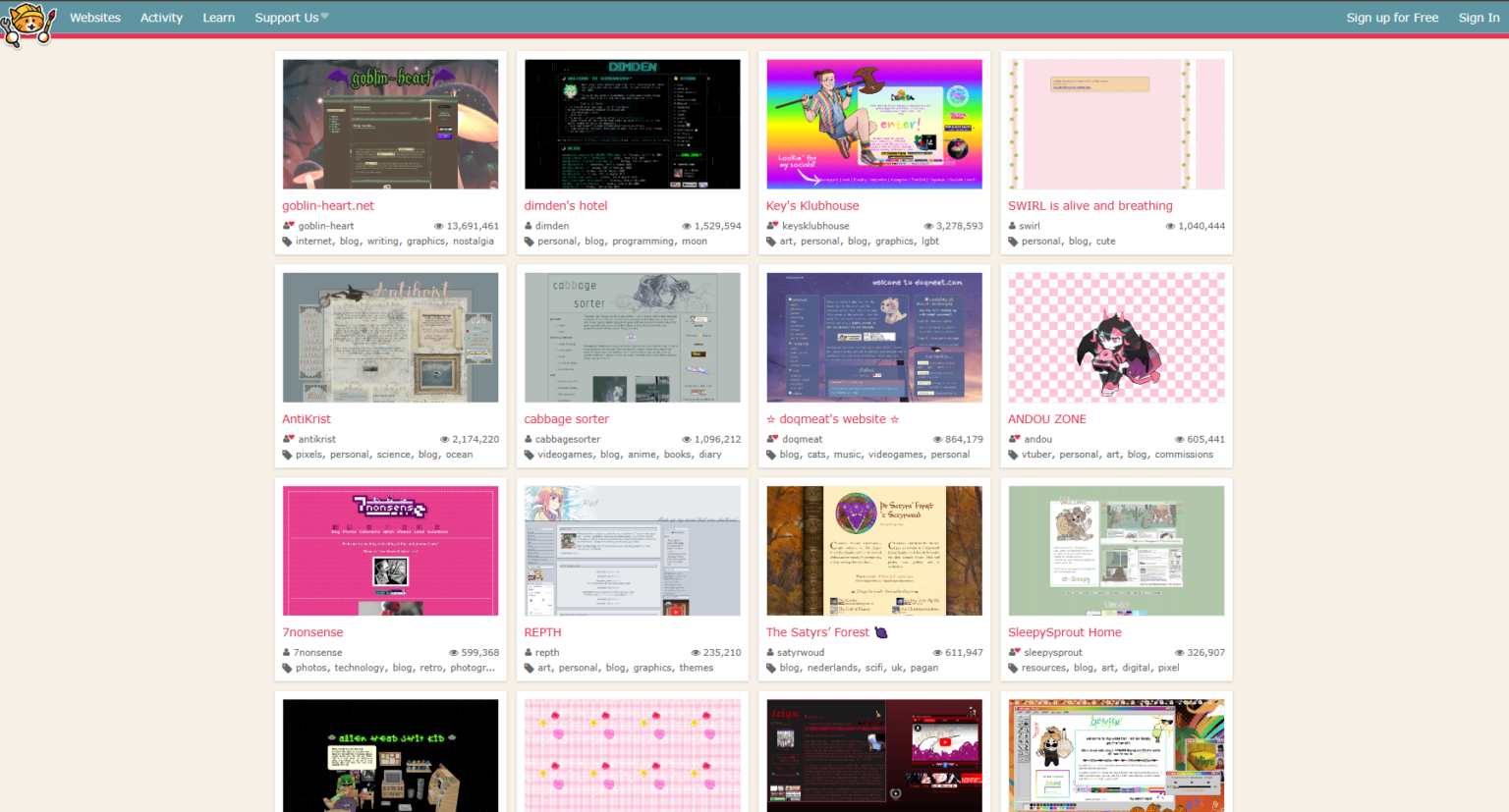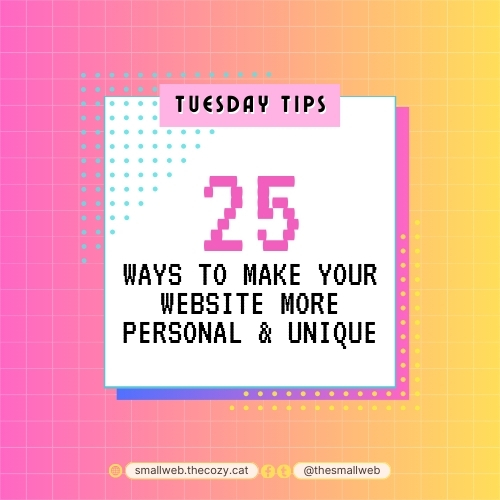TIP: Important terms are bolded within this article. To understand each term’s definition, hover your mouse over it and the definition will appear.
What is the Small Web?
The Small Web movement is a growing community of individuals opting to step away from the dominant, corporate-driven web, commonly referred to as Web 2.0, the Big Web, Big Tech, or the ‘core’ web. Instead, many are exploring a more decentralized and personal part of the internet, known as the Small Web, Indie Web, the Personal Web, the Old Web, Web Revival and the Peripheral Web (these terms are often all used interchangeably, though, some have similar but different definitions. Hover over each of the terms to learn their definitions). The concept of the Small Web stands apart from terms like the dark web or deep web, and focuses more on the ownership and nature of the online spaces people use.
The Core Web/Web 2.0/Big Tech/Big Web (more terms you will come to find are often used interchangeably) represent the mainstream internet most people use daily, centered around platforms like Facebook, Twitter, TikTok, and Reddit. These platforms are part of an ecosystem controlled by large companies such as Google, Amazon, and Microsoft, which shape users’ online experiences by leveraging algorithms, targeted ads, and data collection to maximize profits. Big Tech keeps users within the boundaries of its platforms, often exploiting personal data for commercial gain while shaping what users see and interact with on their platforms.
In contrast, the Small Web is the digital equivalent of a countryside—a less commercialized and more community-driven part of the internet. Platforms like Mastodon, Neocities, SpaceHey, IRC, and Matrix chat rooms serve as alternatives to the corporate-dominated web. These spaces typically reject the invasive practices of targeted advertising and heavy data collection, offering users a more authentic, privacy-respecting experience. The Small Web tends to be discovered organically through personal exploration and recommendations rather than being indexed and readily visible through mainstream search engines. While it requires more effort to find and engage with, the Small Web offers more personal freedom and creative expression.

Origins
The movement largely stems from frustration with the worsening conditions on Big Tech social networking platforms. This shift away from Big Tech is often driven by a desire for a better experience; more creativity, less censorship, more privacy, more control over one’s personal data, and more freedom of self expression online.
The Small Web’s growth primarily focuses on word-of-mouth rather than strategic or paid advertising. Periodic spikes in activity fuel the Small Web movement, typically following incidents that trigger dissatisfaction with corporate-controlled platforms. These moments, often sparked by policy changes, controversial decisions, social unrest, or promoting controversial political biases, lead to waves of discontentment among Big Tech users. In response, Small Web users attempt to persuade others to migrate, though, the transition can sometimes be difficult for users who have become accustomed to the more simplistic, intuitive nature Big Tech platforms tend to offer. The Small Web is a very different way of socializing on the web and is structured quite different. Like all new things, change is often uncomfortable for people. It takes courage to step out of the box and explore lesser known alternatives.
Nostalgia has also been a major force behind the shift toward the Small Web. Interestingly, nostalgia for the “old web” isn’t limited to those who experienced it firsthand. Younger users, including kids and teens, developed anemoia. This feeling within the younger generations stemmed from dissatisfaction with the modern internet, which many young people had grown up with.

Anonymity and Pseudonymity
Within the Small Web movement, it is common that individuals typically either use pseudonyms or may share their real-life identities, sometimes mixing both.
People choose pseudonyms for many reasons, including wanting to protect their privacy, separate their professional and personal lives, or simply for personal preference. For some, pseudonyms provide a shield of anonymity, particularly for those who are vocal online. This layer of protection helps to safeguard their personal lives from those who might try to bully, harass or even reveal sensitive information (doxxing). In contentious or public-facing spaces, pseudonyms become a vital tool for individuals seeking to engage freely without risking exposure or retaliation.
Things to Bear in Mind
As with most movements, there will inevitably be individuals or groups attempting to shape and control the direction of the movement to align with their own ideologies and virtues. This, however, presents a deep irony, as it contradicts the very reasons many choose to leave Big Tech spaces in the first place. People do not abandon the dominance of Big Tech in pursuit of digital freedom and autonomy over their content and data, only to be told by others within the movement what they can or cannot do or say within their own personal spaces. It’s important to be vigilant of those within the movement who seek to dictate or moderate your actions or speech as a condition of belonging. The essence of this movement is inclusivity—anyone, regardless of their virtues, ideologies, political beliefs, or walk of life can be part of it. Those who attempt to exert control over others, even under the guise of good intentions, ultimately act in bad faith and undermine many of the movement’s core values. This is simply something to bear in mind if you choose to join the movement: always remain authentic to who you are, and don’t allow others to bully you into submission of their ideologies. In expressing yourself authentically, you will naturally find your community here.
TIP: If you need a starting point of connection into this movement, do feel free to connect with me anytime via my guestbook or contact page. 🙂 I am always happy to offer a helping hand as well as befriend newcomers. I also run the Free Speech Webring, which I encourage newcomers to join. It’s a great way to discover and meet others who value freedom of speech and expression within this movement!

Is the Small Web right for you? You decide.
The Small Web is more than a collection of niche platforms—it’s a grassroots revolution pushing back against the corporate-controlled, data-driven nature of today’s internet. As Big Tech continues to encroach on our online freedoms, the Small Web offers a beacon of hope for those yearning to reclaim their digital autonomy. It empowers users to take control of their online experiences, free from the algorithms that dictate what we see, think, and share.
By joining the Small Web, you become part of a community that values personal privacy, creative freedom, and authentic human connections over profit-driven motives. This movement is about rediscovering the internet’s roots—an open space for innovation, individuality, and real interaction – where real people can thrive above the noise of business and brands. You’re not just a passive consumer on the Small Web; you are an active participant in building a better, more sustainable digital world.
The Small Web is for those who want to escape the online matrix; an increasingly homogenized experience of mainstream platforms. It’s for creators, thinkers, and explorers who believe the internet should be more than just a commercialized tool—it should be a place where creativity thrives, privacy is respected, communities can flourish, and ultimately be a more personal (and personalized) experience.
Making this shift does not mean you need to completely break away from Big Tech overnight, or even completely. The beauty of this movement is that it doesn’t force you to choose between one or the other. Not everyone joins this movement for the same motives, and you can very much remain an active participant in the Big Web should you choose to. As you explore new online spaces and communities within this movement, you may come to find your dependence on corporate-controlled platforms reduced and feel more empowered to move toward a more independent, personalized internet experience. For many of us, it is a slower more gradual transition as we adjust to two very different systems of social networking and online spaces, exploring, building, and discovering new ways to replace the things we liked from the Big Web, while leaving behind the things we didn’t like. I encourage you to take your time in exploring and understanding this movement, allow yourself the patience in learning a new online experience, and discovering a new way of interacting online than what you’re currently used to. This is very much a journey, not a race to the finish line.
Join the Small Web movement and embark on a journey towards a more liberated online experience. By exploring this vibrant alternative, you’ll discover the freedom to express yourself authentically, connect with like-minded individuals across the globe, and reclaim your online autonomy. Every small step you take contributes to a larger shift toward a user-driven internet that prioritizes creativity, community, and personal control over your online identity and online space. No longer do you have to be a passive participant in the web Big Tech created— rather, you can start to become an active part of the change you’d like to see on the web.



